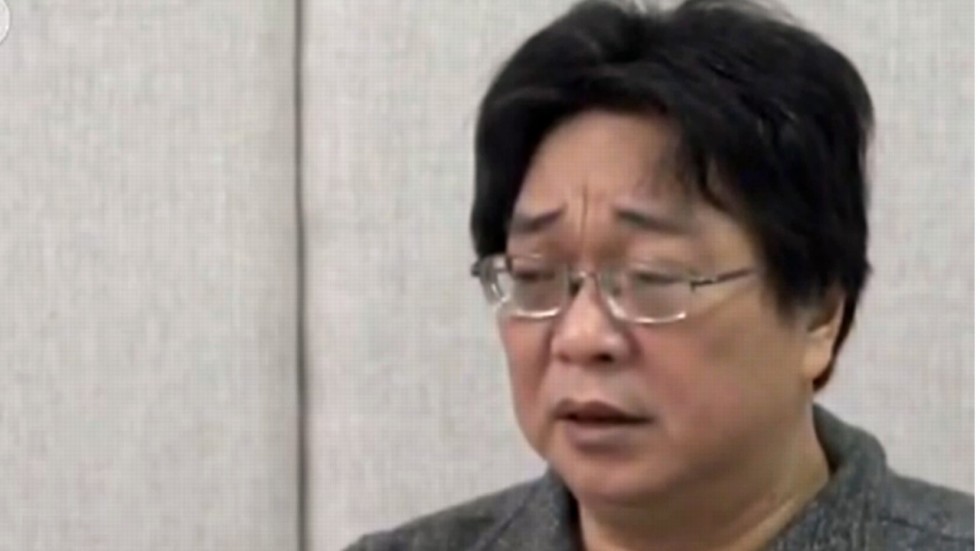REUTERS

Gui Minhai's forced confession
STOCKHOLM/HONG KONG--Sweden said on Saturday it would keep pressing China to release Swedish citizen and publisher Gui Minhai, even after he was shown in a filmed interview criticizing Stockholm for "sensationalizing" his case.
Gui was shown in an interview with journalists posted online overnight, making a statement that Amnesty International and other campaign groups said could have been staged.
There was no immediate reaction to the rights groups from Chinese authorities.
The former Hong Kong-based publisher of books critical of China's leaders, was abducted in Thailand in 2015.
The former Hong Kong-based publisher of books critical of China's leaders, was abducted in Thailand in 2015.
He was one of five people in the Hong Kong book trade who went missing that year and later appeared in mainland Chinese custody.
After being partially released from Chinese custody late last year, he was seized last month by 10 plainclothes Chinese agents onboard a Beijing-bound train while in the presence of two Swedish diplomats.
In the latest twist of the saga, Hong Kong's South China Morning Post posted clips of Gui speaking to journalists about his case.
Gui, who has a Swedish passport, appeared relaxed at times in the footage.
After being partially released from Chinese custody late last year, he was seized last month by 10 plainclothes Chinese agents onboard a Beijing-bound train while in the presence of two Swedish diplomats.
In the latest twist of the saga, Hong Kong's South China Morning Post posted clips of Gui speaking to journalists about his case.
Gui, who has a Swedish passport, appeared relaxed at times in the footage.
But Amnesty International said the comments given to largely pro-establishment media outlets appeared to have been staged.
"It's certainly a forced confession," William Nee, a China researcher with Amnesty International, told Hong Kong's public broadcaster RTHK.
"It's certainly a forced confession," William Nee, a China researcher with Amnesty International, told Hong Kong's public broadcaster RTHK.
"The fact that he's kind of repeating talking points that the (Chinese) government wants to put out ... and as far as we know he's in incommunicado detention. He doesn't have lawyers of his choice or consular access right now."
In the video Gui said that Sweden had tried to get him out of China to Sweden, under the pretext of seeking medical treatment.
"During the journey, they (the Swedish officials) asked me not to get off the train, for fear it would catch other people's attention," Gui said in the online footage.
"I regret this very much now.
"Looking back, I might have become Sweden's chess piece. I broke the law again under their instigation. My wonderful life has been ruined and I would never trust the Swedish ever again."
Swedish foreign ministry spokeswoman Katarina Byrenius Roslund, defended Stockholm's position.
"This video changes nothing. We continue to demand that our citizen be given the opportunity to meet with Swedish diplomatic staff and medical staff," she said in an email to Reuters.
Gui added he was still involved in an unspecified court case involving an "illegal business" and wasn't able to leave China.
In the video Gui said that Sweden had tried to get him out of China to Sweden, under the pretext of seeking medical treatment.
"During the journey, they (the Swedish officials) asked me not to get off the train, for fear it would catch other people's attention," Gui said in the online footage.
"I regret this very much now.
"Looking back, I might have become Sweden's chess piece. I broke the law again under their instigation. My wonderful life has been ruined and I would never trust the Swedish ever again."
Swedish foreign ministry spokeswoman Katarina Byrenius Roslund, defended Stockholm's position.
"This video changes nothing. We continue to demand that our citizen be given the opportunity to meet with Swedish diplomatic staff and medical staff," she said in an email to Reuters.
Gui added he was still involved in an unspecified court case involving an "illegal business" and wasn't able to leave China.
Other details of Gui's charges and detention weren't specified in the video clips.
Gui's daughter, Angela, who is now studying in England and has been highly critical of the Chinese government's handling of her father's case, wasn't immediately available for comment.
Amid reports that Gui's health has worsened, Gui said in the interview that he had spinal and muscle problems, but that this wasn't Amyotrophic lateral sclerosis (ALS), or Lou Gehrig's disease, as some had suggested.
China's foreign ministry did not respond to a request for comment on the interview and whether Gui had been forced into giving it.
Gui's daughter, Angela, who is now studying in England and has been highly critical of the Chinese government's handling of her father's case, wasn't immediately available for comment.
Amid reports that Gui's health has worsened, Gui said in the interview that he had spinal and muscle problems, but that this wasn't Amyotrophic lateral sclerosis (ALS), or Lou Gehrig's disease, as some had suggested.
China's foreign ministry did not respond to a request for comment on the interview and whether Gui had been forced into giving it.
